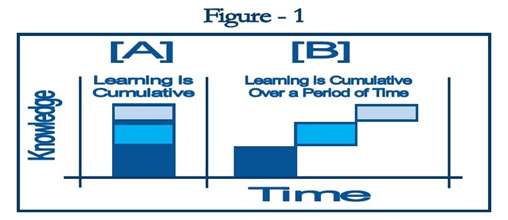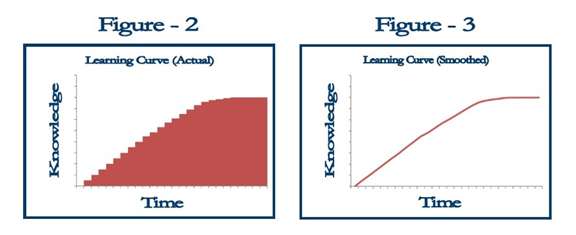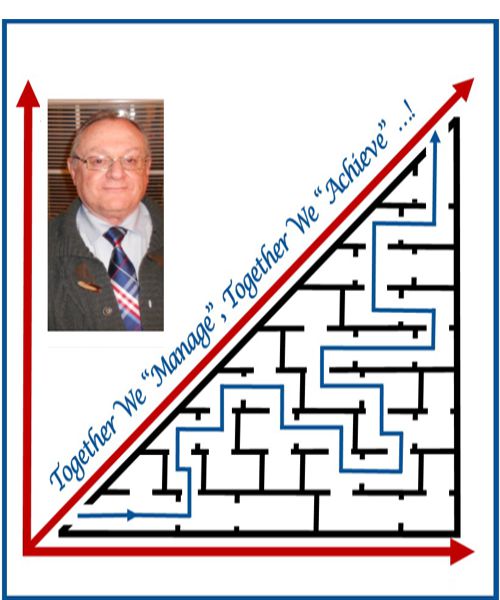Viewpoint
» On "Teaching"
» On "Learning"
» On "Knowledge"
» On "Goals"
» On "Time"
» On “Management”
» On “Reading”
» On "Committees"
» On "A Place to Visit"
» On "Human Resources"
» On "Progress & Development"
» On "History"
» On "Public Speaking"
» On "Organizing"
» On "Motivation"
» On "Teams"
» On "Communication"
» On "Management Coaching"
» On "Traveling"


On "Learning"
By Adel J. Helou
"Learning" may be defined as "the ability to; acquire knowledge (information and skills), understand the subject matter, appreciate the topic, know its value, know how to use that knowledge and know-how, commit this knowledge to memory, to be able to remember this material, to recall it when needed, and to use this knowledge correctly and appropriately".
The benefits of learning are numerous. We can state some of those benefits; broadening our knowledge, improving our self-esteem and self-confidence, improving our interaction and communication with people, improve our acceptance and our position in society, increasing our chances to find work or employment, and improving our economic and financial situation.
The possible approach that describes how individuals learn is simple and interesting. This approach considers learning an amount (a piece) of knowledge - or part of it - as a state of either "learnt" or "not learnt". Alternatively said; learning is a state of:
| "Yes" | or | "No" | where, | Yes: Learnt | No: | Not | |
| Learnt | |||||||
| "On" | or | "Off" | where, | On: Learnt | Off: | Not | |
| Learnt | |||||||
| "1" | or | "0" | where, | 1: Learnt | 0: Not Learnt | ||
The above repetition is for clarification and emphasis, as you might have noticed.
Moreover, there can be no intermediate state of learning any one piece of knowledge - or part of it. In other words, there can not be a state of "I know/I do not know" (a state of ambiguity) in the mind of the learner (pupil, student, trainee, listener, researcher, ...etc.). As stated above, the individual learner would either "know" or "not know" a piece of knowledge - or part of it.
A question may arise when a large (or complex) amount of knowledge is to be learned. In such an event, this large amount would be divided into smaller parts. Each part would then be learnt.
Where needed these parts of knowledge can be divided further into even smaller parts to facilitate learning.
From the above it is clear that learning is acquired in steps and over intervals of time. Additionally, learning steps are cumulative. The most recently learnt piece of knowledge is added to knowledge learnt during an earlier interval of time. Hence the progress and development of individuals occurs as they increase the amount of knowledge acquired and learned over a long period of time (Figure - 1, Figure - 2, Figure - 3).
 |
|
 |
|
To facilitate the process of learning, the pieces of information should be organized and presented to the group of learners in an orderly fashion. Orderly presented information can easily become knowledge, which learners can assimilate and understand. Knowledge that is understood is readily stored in the memory of learners in an organized manner; to be remembered and recalled when it is needed.
The role of memory is prominent in the process of learning. Its role is very apparent during the years of schooling and also during university years. During these years of "studying" to "learn" a relatively large amount of information, then convert this information into useful knowledge; a student (the learner) will depend greatly on his or her memory. Repetition is one good way to make information stick to (in) the memory of a person. So, repeated - and organized - information will find a permanent home in the memory of a person.
Keeping the above in mind; when it comes to studying, a student may be well advised to adopt the following:
- 1) Be attentive in the class. Listen well to the knowledge teachers are presenting (and explaining) in class. In doing so, a student's memory in addressed and exposed for the first time to this material. Being attentive, a student should be able to remember and relay what the teacher said during the class. Taking notes in class where possible should also help remembering the material covered in class.
- 2) In case of younger students, parents could ask children to describe the events of the day at school. This can be done with emphasis on what teachers had said during classes for each subject. Such an exercise could help the children remember the subject covered in class and confirm the knowledge present in their memory. Consequently, confirming and ensuring learning. Parents be patient with the children.
- 3) Students in school grades 6 through 12 and in university are well advised to develop the habit of writing their own notes while reading/studying their books. The benefit of this suggestion is to present the memory of the student multiple times with the knowledge to be learnt. To clarify the above suggestion; while studying, the memory will be presented with the knowledge for a "first time" while reading the text in the book, a "second time" will happen while writing the notes, and reading what is being written, and a "third time" while reading the notes afterward. In short, writing notes would expose the memory of students three times to the material needed to be learnt. Hence, increasing the chances of adding knowledge to the memory of the student and enhancing both remembering and learning.
Adel J Helou: is a Business and Life Management Coach. He has more than 15 years of experience in production and operations management. The Author has international professional experience in the Middle East markets. He holds a B.Sc. degree in Chemistry and Physics and an M.Sc. in Chemical Engineering. Mr. Helou has pages on Facebook, LinkedIn, Twitter, and Instagram:
facebook.com/AdelJosephHelouManagementCoach/
linkedin.com/in/adeljosephheloumanagementcoach/
Instagram.com/adel.helou
twitter.com/helou_adel
Read about his Management Coaching and the articles he writes, by visiting the electronic magazine (E-Zine): optimanage.com.
The E-Zine has a fb page: facebook.com/optimanagedotcom/.
A.J. Helou can be contacted by e-mail: a.j.helou@optimanage.com (e-mail)
linkedin.com/in/adeljosephheloumanagementcoach/
Instagram.com/adel.helou
twitter.com/helou_adel
Read about his Management Coaching and the articles he writes, by visiting the electronic magazine (E-Zine): optimanage.com.
The E-Zine has a fb page: facebook.com/optimanagedotcom/.
A.J. Helou can be contacted by e-mail: a.j.helou@optimanage.com (e-mail)





